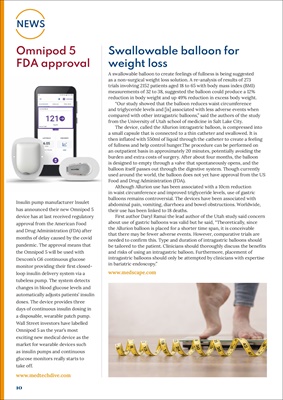
10
NEWS
Omnipod 5
FDA approval
Swallowable balloon for
weight loss
A swallowable balloon to create feelings of fullness is being suggested
as a non-surgical weight loss solution. A re-analysis of results of 273
trials involving 2152 patients aged 18 to 65 with body mass index (BMI)
measurements of 32 to 38, suggested the balloon could produce a 12%
reduction in body weight and up 49% reduction in excess body weight.
"Our study showed that the balloon reduces waist circumference
and triglyceride levels and [is] associated with less adverse events when
compared with other intragastric balloons," said the authors of the study
from the University of Utah school of medicine in Salt Lake City.
The device, called the Allurion intragastric balloon, is compressed into
a small capsule that is connected to a thin catheter and swallowed. It is
then inflated with 550ml of liquid through the catheter to create a feeling
of fullness and help control hunger.The procedure can be performed on
an outpatient basis in approximately 20 minutes, potentially avoiding the
burden and extra costs of surgery. After about four months, the balloon
is designed to empty through a valve that spontaneously opens, and the
balloon itself passes out through the digestive system. Though currently
used around the world, the balloon does not yet have approval from the US
Food and Drug Administration (FDA).
Although Allurion use has been associated with a 10cm reduction
in waist circumference and improved triglyceride levels, use of gastric
balloons remains controversial. The devices have been associated with
abdominal pain, vomiting, diarrhoea and bowel obstructions. Worldwide,
their use has been linked to 18 deaths.
First author Daryl Ramai the lead author of the Utah study said concern
about use of gastric balloons was valid but he said, "Theoretically, since
the Allurion balloon is placed for a shorter time span, it is conceivable
that there may be fewer adverse events. However, comparative trials are
needed to confirm this. Type and duration of intragastric balloons should
be tailored to the patient. Clinicians should thoroughly discuss the benefits
and risks of using an intragastric balloon. Furthermore, placement of
intragastric balloons should only be attempted by clinicians with expertise
in bariatric endoscopy."
www.medscape.com
Insulin pump manufacturer Insulet
has announced their new Omnipod 5
device has at last received regulatory
approval from the American Food
and Drug Administration (FDA) after
months of delay caused by the covid
pandemic. The approval means that
the Omnipod 5 will be used with
Dexcom's G6 continuous glucose
monitor providing their first closedloop insulin delivery
system via a
tubeless pump. The system detects
changes in blood glucose levels and
automatically adjusts patients' insulin
doses. The device provides three
days of continuous insulin dosing in
a disposable, wearable patch pump.
Wall Street investors have labelled
Omnipod 5 as the year's most
exciting new medical device as the
market for wearable devices such
as insulin pumps and continuous
glucose monitors really starts to
take off.
www.medtechdive.com